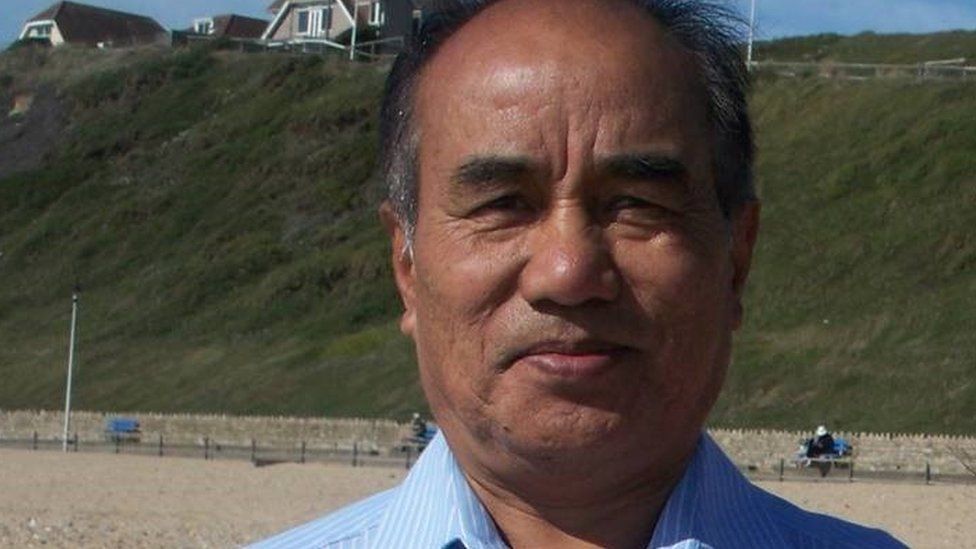BMW recall delay contributed to driver death, inquest finds
- Published

BMW's delay in recalling UK cars with an electrical fault contributed to a driver's death, an inquest has found.
The firm only recalled cars in the UK after Narayan Gurung died when his Ford Fiesta crashed into a tree to avoid a broken-down BMW on Christmas Day 2016.
The Driver and Vehicle Standards Agency (DVSA) was also criticised for failing to press BMW for a recall.
There was insufficient evidence to conclude the death was corporate manslaughter, the inquest found.
Mr Gurung, a former Gurkha from Aldershot, was driving in the early morning of Christmas Day when he collided with a tree after swerving to avoid the black BMW which had stalled on the A31, an unlit road.
The BMW, which was being driven to work by Resham Gurung, a friend and colleague of Mr and Mrs Gurung, had suffered "a total electrical failure". He tried to put on his hazard lights but the lack of power meant this was not possible.
Because it was before sunrise, Mr Gurung was unable to see the vehicle until the last moment, when he swerved and hit a tree. He was pronounced dead at the scene.
Resham Gurung confirmed there were two incidents previously when he could not unlock his car with the key fob.
On both those occasions he had taken it to be checked by an independent garage which had found no fault with the vehicle.
Surrey Assistant Coroner Anna Loxton found it was highly unlikely he would have continued to use the vehicle if he had thought it would suffer a total electrical failure at any time.
'Tragic accident'
The coroner said: "Despite recognising this risk, the DVSA failed to call for, and BMW AG and BMW UK failed to initiate, a recall until after Mr Gurung's death,"
She added the DVSA had been aware of a fault since October 2014 when it started to receive an "unusually high" volume of complaints from drivers, but it did not make a "fundamental shift" until after Mr Gurung's death.
DVSA chief executive Gareth Llewellyn said it accepted the coroner's findings.
"In the past, DVSA's processes may not been as robust or as efficient as they needed to be. We have been addressing this as a matter of urgency and have already made a number of significant changes, ensuring that all reported safety defects are assessed quickly and thoroughly."
BMW said the incident was "a tragic accident".
"Whilst BMW considers that it has followed all the processes required by the relevant regulations, we recognise the need for the automotive industry to review relevant processes and procedures," a spokesperson added.
BMW initially recalled 36,410 petrol cars last year after Mr Gurung's death.
"It was a nightmare, it wasn’t safe enough to drive"
Last month, BMW extended the UK recall of its cars after the BBC's Watchdog found that vehicles could cut out completely while they are being driven.
BMW owner Mwape Kambafwile told the BBC that in December 2016 his BMW 3 Series car had cut out completely while he was driving.
"I just thought to myself if I was driving on the motorway with my family in the car, that could have been very dangerous," he said.
Analysis:
Victoria Fritz, BBC transport correspondent
Despite BMW knowing about the fault for five years before the fatal incident, and even issuing repair kits to dealerships to fix it, there was insufficient evidence, the coroner found, to conclude that Narayan Gurung was unlawfully killed.
The coroner agreed that BMW had been negligent in its duties to drivers, and even went as far as to describe the government agency, the DVSA, as indolent in its safety recall practices.
The family had hoped for a conclusion of corporate manslaughter. Today's ruling, they said, does not represent a comforting or satisfying conclusion.
The DVSA told the coroner that it was developing a revised Code of Practice for safety recalls. The work is due to be completed later this year.
Zahra Nanji, from Leigh Day law firm, said the coroner's finding potentially left BMW open to legal claims if any other similar cases came to light where people were injured as a result of the faulty cars.
Ms Nanji called for a more "robust" system of recalls and said the DVSA should be given the powers to instigate a mandatory recall in such cases.
"Manufacturers are not held to strict time limits by the DVSA about how and when to effect a recall, nor is there a clear warning about potential sanctions for manufacturers who fail to commence a swift recall when safety concerns are raised. We believe this should change in the wake of this tragedy," she said.
- Published9 May 2018
- Published9 May 2018
- Published2 May 2018
- Published20 March 2018